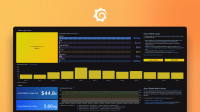Caution
Grafana Alloy is the new name for our distribution of the OTel collector. Grafana Agent has been deprecated and is in Long-Term Support (LTS) through October 31, 2025. Grafana Agent will reach an End-of-Life (EOL) on November 1, 2025. Read more about why we recommend migrating to Grafana Alloy.
discovery.openstack
discovery.openstack discovers OpenStack Nova instances and exposes them as targets.
Usage
discovery.openstack "LABEL" {
role = "hypervisor"
region = "us-east-1"
}Arguments
The following arguments are supported:
role must be one of hypervisor or instance.
username is required if using Identity V2 API. In Identity V3, either userid or a combination of username and domain_id or domain_name are needed.
project_id and project_name fields are optional for the Identity V2 API. Some providers allow you to specify a project_name instead of the project_id. Some require both.
application_credential_id or application_credential_name fields are required if using an application credential to authenticate. Some providers allow you to create an application credential to authenticate rather than a password.
application_credential_secret field is required if using an application credential to authenticate.
all_tenants is only relevant for the instance role and usually requires admin permissions.
availability must be one of public, admin, or internal.
Blocks
The following blocks are supported inside the definition of discovery.openstack:
tls_config block
The following pairs of arguments are mutually exclusive and can’t both be set simultaneously:
ca_pemandca_filecert_pemandcert_filekey_pemandkey_file
When configuring client authentication, both the client certificate (using
cert_pem or cert_file) and the client key (using key_pem or key_file)
must be provided.
When min_version is not provided, the minimum acceptable TLS version is
inherited from Go’s default minimum version, TLS 1.2. If min_version is
provided, it must be set to one of the following strings:
"TLS10"(TLS 1.0)"TLS11"(TLS 1.1)"TLS12"(TLS 1.2)"TLS13"(TLS 1.3)
Exported fields
The following fields are exported and can be referenced by other components:
hypervisor
The hypervisor role discovers one target per Nova hypervisor node. The target
address defaults to the host_ip attribute of the hypervisor.
__meta_openstack_hypervisor_host_ip: the hypervisor node’s IP address.__meta_openstack_hypervisor_hostname: the hypervisor node’s name.__meta_openstack_hypervisor_id: the hypervisor node’s ID.__meta_openstack_hypervisor_state: the hypervisor node’s state.__meta_openstack_hypervisor_status: the hypervisor node’s status.__meta_openstack_hypervisor_type: the hypervisor node’s type.
instance
The instance role discovers one target per network interface of Nova
instance. The target address defaults to the private IP address of the network
interface.
__meta_openstack_address_pool: the pool of the private IP.__meta_openstack_instance_flavor: the flavor of the OpenStack instance.__meta_openstack_instance_id: the OpenStack instance ID.__meta_openstack_instance_image: the ID of the image the OpenStack instance is using.__meta_openstack_instance_name: the OpenStack instance name.__meta_openstack_instance_status: the status of the OpenStack instance.__meta_openstack_private_ip: the private IP of the OpenStack instance.__meta_openstack_project_id: the project (tenant) owning this instance.__meta_openstack_public_ip: the public IP of the OpenStack instance.__meta_openstack_tag_<tagkey>: each tag value of the instance.__meta_openstack_user_id: the user account owning the tenant.
Component health
discovery.openstack is only reported as unhealthy when given an invalid
configuration. In those cases, exported fields retain their last healthy
values.
Debug information
discovery.openstack does not expose any component-specific debug information.
Debug metrics
discovery.openstack does not expose any component-specific debug metrics.
Example
discovery.openstack "example" {
role = OPENSTACK_ROLE
region = OPENSTACK_REGION
}
prometheus.scrape "demo" {
targets = discovery.openstack.example.targets
forward_to = [prometheus.remote_write.demo.receiver]
}
prometheus.remote_write "demo" {
endpoint {
url = PROMETHEUS_REMOTE_WRITE_URL
basic_auth {
username = USERNAME
password = PASSWORD
}
}
}Replace the following:
OPENSTACK_ROLE: Your OpenStack role.OPENSTACK_REGION: Your OpenStack region.PROMETHEUS_REMOTE_WRITE_URL: The URL of the Prometheus remote_write-compatible server to send metrics to.USERNAME: The username to use for authentication to the remote_write API.PASSWORD: The password to use for authentication to the remote_write API.
Compatible components
discovery.openstack has exports that can be consumed by the following components:
- Components that consume Targets
Note
Connecting some components may not be sensible or components may require further configuration to make the connection work correctly. Refer to the linked documentation for more details.




